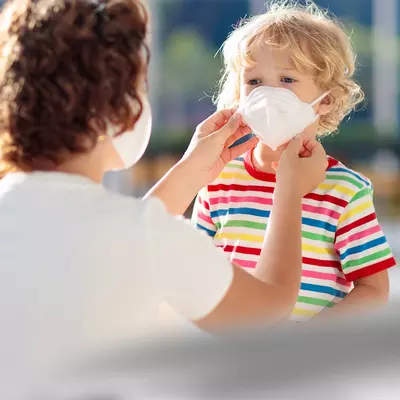- AdventHealth

On the blog recently, we published an article outlining many common myths and facts surrounding coronavirus. With coronavirus being such a popular topic in the news, more ideas and practices are being tossed out that may or may not be true.
As we continue to learn more about the disease, The Centers for Disease Control and Prevention (CDC) and other experts are providing additional insight that allows us to look at even more coronavirus myths versus facts.
Myth: There is a vaccine to cure the current strain of coronavirus.
Fact: While scientists have begun working on a vaccine, there isn’t one available at this time.
Since there is no vaccine to prevent coronavirus infection, the best way to prevent illness is to avoid being exposed to it. View prevention steps from the CDC here.
Myth: You should only wear masks if you’re sick.
Fact: The CDC recommends wearing cloth face coverings in public places like grocery stores and pharmacies, especially in high transmission areas.
A significant portion of infected people who are asymptomatic or will eventually develop symptoms can transmit the virus to others before showing signs of infection. This means the virus can spread by speaking, coughing or sneezing even if they aren’t exhibiting symptoms.
Myth: Vitamin C will help prevent or cure coronavirus.
Fact: There is no antiviral medication or treatment recommended by officials, says the CDC.
While supplements can’t prevent any illness, such as coronavirus, vitamin C may support your immune function. The U.S. Food and Drug Administration (FDA) shared that they’ve issued warning letters to many companies selling items they marketed towards treating and preventing coronavirus.
Myth: For healthy people, it’s safe to keep going to the gym.
Fact: The CDC has recommended more aggressive social-distancing measures, calling for even healthy people to limit exposure to others and stay home as much as possible. For now, you should not go to the gym.
The CDC has advised against gatherings of 10 people or more, and some cities have moved to temporarily shut down bars and restaurants. Many gyms and fitness studios have temporarily closed their doors to encourage people to stay home and stop the spread of COVID-19. In that spirit, experts recommend shifting exercises to those that can be done at home or while keeping a safe distance from others outdoors.
Myth: Cold weather and snow can kill coronavirus.
Fact: According to the World Health Organization (WHO), there is no reason to believe that cold weather can kill the new coronavirus or other diseases.
WHO explains that the normal human body temperature remains the same, regardless of the temperature outside. Washing your hands thoroughly remains the only known effective method of protection against coronavirus disease.
Myth: Spraying your body with alcohol or chlorine will kill viruses.
Fact: These chemicals will not kill viruses that have already entered your body.
Alcohol and chlorine can be used to disinfect surfaces, but if used on skin, eyes, the mouth, etc., they can be harmful.
Sources You Can Trust
There are a lot of rumors out there, but before following the advice of someone, check with a reliable source that you can trust, such as:
- Centers for Disease Control and Prevention (CDC)
- World Health Organization (WHO)
- U.S. Department of Health and Human Services (HHS)
- State Department of Health (DOH)
Visit our Coronavirus Resource Hub, to learn more about the novel coronavirus and answers to other FAQs. To stay up to date with the latest coverage on coronavirus, including how to best protect yourself and your family, visit the CDC online.



